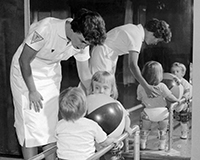We also study the processes by which these patient associations interacted with researchers, the health system and the mass media. One of the key elements to consider is how medical, social, political, economic and cultural factors defined agendas, established priorities and contributed to the creation of new identities of sufferers and professionals.
Our research will be carried out along the following lines:
- a) the scientific discussions on the “new” infectious agents and social concern;
- b) polio as an emerging illness in the Iberian Peninsula (the context in which it occured, epidemicity vs. endemicity, incidence);
- c) the official responses (organisational and public health measures, immunisations, specialised clinical services, means of health propaganda;
- d) the new professional identities (physiotherapists, rehabilitation specialists, occupational therapists, orthopaedic doctors, paediatricians);
- e) private initiatives, the role played by religious orders and charities) and d) the main actors: the patients, and their self-help associations.
Regarding this last aspect, individual and collective experiences of the illness, lead us to a history of medicine from the patient’s point of view. In polio patients, as in other pathologies, there is a singularity, knowledge that can and must be “translated” by the health professional, but this cannot replace the wealth of a first person narrative which is what we wish to analyse through oral history, taking advantage of the contemporary nature of the subject and the existence of a high number of people who survived the illness.
Finally, the infant paralysis outbreaks in European countries with high standards of socio-economic and sanitary development and, also in other parts of the Continent, meant that collective feelings and social mobilisation emerged which led states to take an active part in the response to the serious problem which arose, above all, in the middle of the last century. However this process depended on local contexts, and it is therefore pertinent to compare the organisational, techno-scientific, social and cultural responses between two countries, Spain and Portugal, that shared a similar, dictatorial political system, and also to compare events in these two countries with those of other nations with established democracies and a higher level of development like Sweden, Great Britain or Germany.
Ballester Añón, Rosa
Báguena Cervellera, María José
Ministry of Science and Innovation
University of Alicante











